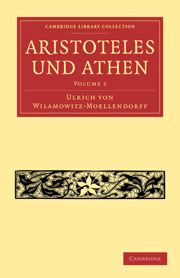Book contents
- Frontmatter
- Contents
- ZWEITES BUCH. Untersuchungen auf grund der aristotelischen Politie
- DRITTES BUCH. Beilagen
- 1 Die phratrie der Demotioniden
- 2 Der erste krieg mit Aegina
- 3 Die chronologie der pentekontaetie
- 4 Solons gedichte
- 5 Die attische skoliensammlung
- 6 Pindaros siebentes pythisches gedicht
- 7 Der process der Eumeniden
- 8 Die zeit der Thesmophoriazusen
- 9 Die rede für Polystratos
- 10 Die paragraphe und Lysias wider Pankleon
- 11 Lysias wider die kornhändler
- 12 Isokrates Panegyrikos 100–114
- 13 Die briefe des Isokrates
- 14 Demosthenes prooemium 55
- 15 Die gedichte des Aristoteles
- Sachregister
7 - Der process der Eumeniden
Published online by Cambridge University Press: 10 November 2010
- Frontmatter
- Contents
- ZWEITES BUCH. Untersuchungen auf grund der aristotelischen Politie
- DRITTES BUCH. Beilagen
- 1 Die phratrie der Demotioniden
- 2 Der erste krieg mit Aegina
- 3 Die chronologie der pentekontaetie
- 4 Solons gedichte
- 5 Die attische skoliensammlung
- 6 Pindaros siebentes pythisches gedicht
- 7 Der process der Eumeniden
- 8 Die zeit der Thesmophoriazusen
- 9 Die rede für Polystratos
- 10 Die paragraphe und Lysias wider Pankleon
- 11 Lysias wider die kornhändler
- 12 Isokrates Panegyrikos 100–114
- 13 Die briefe des Isokrates
- 14 Demosthenes prooemium 55
- 15 Die gedichte des Aristoteles
- Sachregister
Summary
Die kämpfe um den Areopag haben dem grössten dichter des fünften jahrhunderts sein letztes werk eingegeben; so wenig es unmittelbar für die politische geschichte ergibt, können wir doch die stimmung der zeit nur aus ihm unmittelbar auf uns wirken lassen, und es ist früher so viel auch politisches in ihm gesucht worden, dass ich nicht umhin kann, die scene des processes der Eumeniden zu erläutern, zumal es kurz geschehen kann. ein par wichtige stellen kann ich verbessern, andere bleiben noch im einzelnen rätselbaft; die heut zu tage beliebten athetesen und umstellungen fallen von selbst weg, sobald der zusammenhang erkannt ist.
Als der göttin Athena sowol von Orestes wie von den Erinyen die entscheidung ihres zwistes übertragen ist (als δíαιτα gewissermassen), lehnt sie ab in einer mordsache aus sich, αὐτоτ∈λῶς, zu entscheiden und erklärt einen beirat aus den edelsten ihres volkes (ἀϱίστíνδην) zuziehen zu wollen, die als geschworne den spruch fällen sollen, und sie stellt schon hier in aussicht, dass sie damit eine dauernde institution schaffen wolle, 470–89. die verse sind zum teil schwer verdorben, aber die gedanken sind unzweifelhaft. mittlerweile sollen die parteien ihre beweismittel und ihre zeugen herbeischaffen. es entsteht also eine pause, die durch ein grosses chorlied ausgefüllt wird.
Dann erscheint Athena mit dem herold (der als ϰῆϱνξ τῆς ἐν Ἀϱ∈ίῳ πάγῳ βоνλῆς später eine so grosse rolle gespielt hat, jetzt nur ein subalterner ist) und den richtern. sein trompetenstoss soil dem volke, das zu dem feierlichen acte herzuströmt, das signal geben, platz zu machen und zu schweigen.
- Type
- Chapter
- Information
- Aristoteles und Athen , pp. 329 - 342Publisher: Cambridge University PressPrint publication year: 2010First published in: 1893



